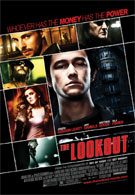Levitt’s performance is quite brilliant – not the kind of thing you’d expect from a kid who grew up playing an alien on “3rd Rock From the Sun,” but it’s Scott Frank’s commitment to use Chris’s condition as a catalyst and not as a definition of the character that makes The Lookout an early contender to be one of the best pictures of 2007.
But I’ve gotten my sequencing out of order. I really should start at the beginning, not the end.
The Lookout stars Joseph Gordon-Levitt in a role equally as challenging and interesting as his characters from Brick or Mysterious Skin. Here he plays Chris Pratt, a talented high school athlete with a bright future ahead of him. Unfortunately, in the movie’s opening act, Chris is responsible for a terrible car accident that kills two of his friends and damages Chris’s brain. The rest of the movie picks up four years later, as Chris is learning to cope with his disability and deal with the consequences of a catastrophe he was responsible for.
The damage to Chris’s brain causes him to have problems with complex tasks. He doesn’t read the newspaper because understanding it frustrates him. He mixes up sequencing events. When asked to make a list of things he does in a day, he lists “wake up” three or four times. By day Chris attends life skills classes to help him adapt to normal life. By night he holds a job as a janitor in a bank. It’s the combination of Chris’s high school history, his disability, and his job that makes him the perfect target for a group of bank robbers who decide to get Chris’s help, turning him into the lookout for a job robbing the bank where he works.
Writer Scott Frank (Dead Again, Get Shorty) steps behind the camera for the first time to serve as both author and director of The Lookout. It’s immediately evident that Frank had a clear vision for his story – a vision that is brought to fruition by having him serve as both writer and director, avoiding any potential interference. Frank doesn’t attempt to surround a film around a mental condition like Memento, where Leonard Shelby’s condition defined the character. Instead, Chris’s brain damage serves as a catalyst for the character. He carries the guilt of his accident and faces life with a discontent spirit. He wants more – the life he was originally headed for before his car accident. Because of his condition he can’t have it though, so when he is approached by one of the robbers, who knew him from his high school heroics, he easily falls prey to their plans. If anything, the film centers more around a character wanting to relive his high school fame and appease guilt than one dealing with a mental condition.
Frank’s script gives the actors quite a bit of material to work with, which, as director, he obviously was able to help mold to match his vision. Levitt plays Chris excellently, really bringing out the underlying frustration in the character’s life. His performance is not the only notable part of the movie however. Isla Fisher could have merely shown up and looked hot and been excellent, however her character, who serves as a potential love interest for Chris, has quite a bit of depth to it. Matthew Goode plays Gary, the character who hooks Chris into the heist. Gary is clearly playing Chris from the start, but in such a way that draws the audience in with a desire to see just where things are going to go next. The real scene stealer, however, is Jeff Daniels, who plays Chris’s blind roommate. Daniels takes the challenge of playing a blind character with real skill and provides Chris’s anchor to reality. He’s the one character that accepts Chris as he is – mental condition and all – when even Chris isn’t willing to accept that.
The only character complaint I can hold is with Bone (Greg Dunham), the heavy of the robbers. My complaint isn’t with Dunham’s portrayal of a dark, clearly dangerous figure but with the character himself. In a movie full of complex, deep characters, Bone is extremely one-dimensional. You know from the second you see him that Bone is a hard-ass, and is going to be the “big bad” of the film. The single dimension just doesn’t fit in this film. Thankfully, he’s a minor character, but one small error Frank should have put a bit more polish on.
With deliciously complex characters and an interesting plot that stems from those characters instead of centering around a simple gimmick, The Lookout is a brilliantly told story that is completely worth checking out. Sadly, as a smaller film, you might have to make a little effort to seek it out and give it your time. Do it. In a year full of potential blockbusters, The Lookout rises above to set the high mark of quality for the year.











